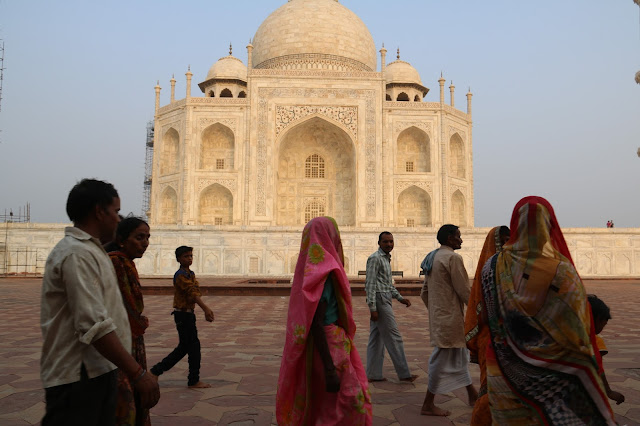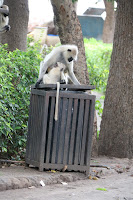 |
| Morning at the Taj Mahal |
I overheard somebody at a restaurant saying that they did not like India at
all because it was a dirty country. I could not help it but take it personally.
Having been there, I have something more to say other than, yes, some of the places my husband and I visited were dirty.
To say we went to India is to fill our mouths with a big word. India is a
subcontinent inhabited by over a billion people, where 64 languages and at
least 400 different dialects are spoken. It is divided in 29 states and
independent regions with different culture and traditions, and all major
religions of the world are represented. It has miles of beaches, deserts,
mountains in the Himalaya’s Plateau, rain forests, and 30 cities with at least
one million residents. It boasts 21 monuments as World Heritage sites, and some
of their archaeological finds date back 7000 years. We saw a speck of India, and
it would be simplistic to define it in just one word.
 |
| Mehrangarh fort in Jodhpur |
In our journey we did not go to see modern India. We just got a brief
glimpse of Central Delhi and its governmental buildings, quiet museums, and wide
roundabouts populated by countless rickshaws, buses, and motorcycles. We skipped
Mumbai and its sparkling movie sets, ultra-modern real estate projects, its
world famous Victoria Rail Station, and of course its slums, that hold about 4
out of its 13 million residents.
We went to see India’s grandeur through its historical
sights. We visited forts built by the maharajahs 450 years ago; we entered the
most famous mausoleum in the world, left as a testament of love and splendor;
and we contemplated temples of various religions that stand as evidence of a
spiritual people.
 |
| Entrance to Ranakpur Temple |
As we moved from place to place, either walking, or riding a rickshaw or
a tourist car, we got to see India’s daily life: women washing clothes in their
doorway, worshipers leaving offerings in the temple, children walking to
school with their grandparents, storekeepers measuring grain, drinking tea, or
reading the newspaper, and even goat herders finding their way on a busy
intersection. In the midst of all that, we saw sacred cows foraging trash bins,
stray dogs running in packs, and a wide variety of monkeys grooming their young
or catching bananas thrown by the locals. Yes, there is trash in the middle of
that, but to us, the beauty of people’s lives prevailed.
 |
| City Palace, Udaipur |
From the forts to the temples to the palaces, a word comes to mind.
Contrast might be the word that best describes a visit to India. Contrast in
the many ways people live their religion, in their adherence to a millennia old
cast system, in the food, so thoughtfully prepared, and in the variety of
landscapes, that satisfy any curious eye. There is trash, there is corruption,
and there are a lot of problems to be solved. But there is also a country with
an old soul, where wars have been fought, conquerors have been defeated, and
where the presence of the gods reassure its people that life goes on.
